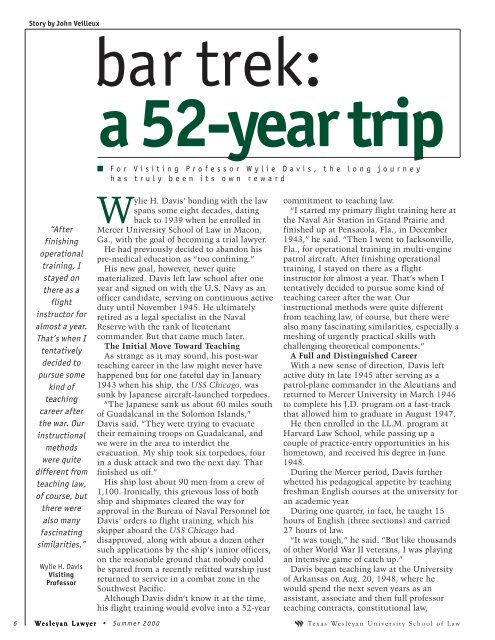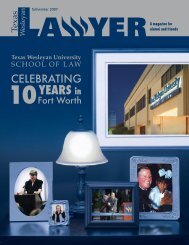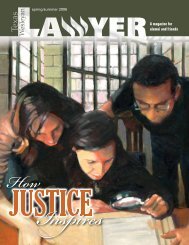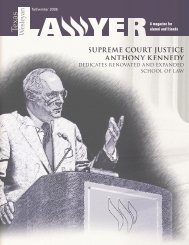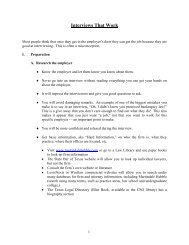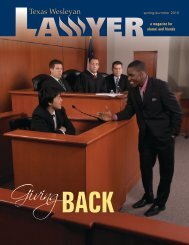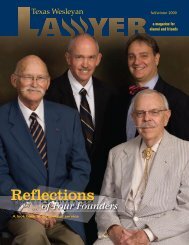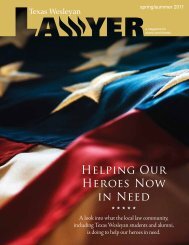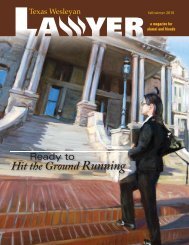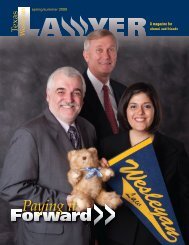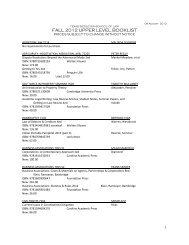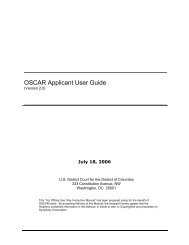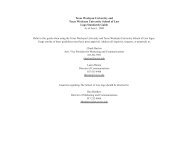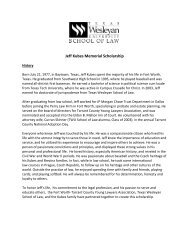21903 TWLS summer2000 - Texas Wesleyan School of Law - Texas ...
21903 TWLS summer2000 - Texas Wesleyan School of Law - Texas ...
21903 TWLS summer2000 - Texas Wesleyan School of Law - Texas ...
You also want an ePaper? Increase the reach of your titles
YUMPU automatically turns print PDFs into web optimized ePapers that Google loves.
Story by John Veilleux<br />
“After<br />
finishing<br />
operational<br />
training, I<br />
stayed on<br />
there as a<br />
flight<br />
instructor for<br />
almost a year.<br />
That’s when I<br />
tentatively<br />
decided to<br />
pursue some<br />
kind <strong>of</strong><br />
teaching<br />
career after<br />
the war. Our<br />
instructional<br />
methods<br />
were quite<br />
different from<br />
teaching law,<br />
<strong>of</strong> course, but<br />
there were<br />
also many<br />
fascinating<br />
similarities.”<br />
Wylie H. Davis<br />
Visiting<br />
Pr<strong>of</strong>essor<br />
bar trek:<br />
a 52-year trip<br />
■ For Visiting Pr<strong>of</strong>essor Wylie Davis, the long journey<br />
has truly been its own reward<br />
Wylie H. Davis’ bonding with the law<br />
spans some eight decades, dating<br />
back to 1939 when he enrolled in<br />
Mercer University <strong>School</strong> <strong>of</strong> <strong>Law</strong> in Macon,<br />
Ga., with the goal <strong>of</strong> becoming a trial lawyer.<br />
He had previously decided to abandon his<br />
pre-medical education as “too confining.”<br />
His new goal, however, never quite<br />
materialized. Davis left law school after one<br />
year and signed on with the U.S. Navy as an<br />
<strong>of</strong>ficer candidate, serving on continuous active<br />
duty until November 1945. He ultimately<br />
retired as a legal specialist in the Naval<br />
Reserve with the rank <strong>of</strong> lieutenant<br />
commander. But that came much later.<br />
The Initial Move Toward Teaching<br />
As strange as it may sound, his post-war<br />
teaching career in the law might never have<br />
happened but for one fateful day in January<br />
1943 when his ship, the USS Chicago, was<br />
sunk by Japanese aircraft-launched torpedoes.<br />
“The Japanese sank us about 60 miles south<br />
<strong>of</strong> Guadalcanal in the Solomon Islands,”<br />
Davis said. “They were trying to evacuate<br />
their remaining troops on Guadalcanal, and<br />
we were in the area to interdict the<br />
evacuation. My ship took six torpedoes, four<br />
in a dusk attack and two the next day. That<br />
finished us <strong>of</strong>f.”<br />
His ship lost about 90 men from a crew <strong>of</strong><br />
1,100. Ironically, this grievous loss <strong>of</strong> both<br />
ship and shipmates cleared the way for<br />
approval in the Bureau <strong>of</strong> Naval Personnel for<br />
Davis’ orders to flight training, which his<br />
skipper aboard the USS Chicago had<br />
disapproved, along with about a dozen other<br />
such applications by the ship’s junior <strong>of</strong>ficers,<br />
on the reasonable ground that nobody could<br />
be spared from a recently refitted warship just<br />
returned to service in a combat zone in the<br />
Southwest Pacific.<br />
Although Davis didn’t know it at the time,<br />
his flight training would evolve into a 52-year<br />
commitment to teaching law.<br />
“I started my primary flight training here at<br />
the Naval Air Station in Grand Prairie and<br />
finished up at Pensacola, Fla., in December<br />
1943,” he said. “Then I went to Jacksonville,<br />
Fla., for operational training in multi-engine<br />
patrol aircraft. After finishing operational<br />
training, I stayed on there as a flight<br />
instructor for almost a year. That’s when I<br />
tentatively decided to pursue some kind <strong>of</strong><br />
teaching career after the war. Our<br />
instructional methods were quite different<br />
from teaching law, <strong>of</strong> course, but there were<br />
also many fascinating similarities, especially a<br />
meshing <strong>of</strong> urgently practical skills with<br />
challenging theoretical components.”<br />
A Full and Distinguished Career<br />
With a new sense <strong>of</strong> direction, Davis left<br />
active duty in late 1945 after serving as a<br />
patrol-plane commander in the Aleutians and<br />
returned to Mercer University in March 1946<br />
to complete his J.D. program on a fast-track<br />
that allowed him to graduate in August 1947.<br />
He then enrolled in the LL.M. program at<br />
Harvard <strong>Law</strong> <strong>School</strong>, while passing up a<br />
couple <strong>of</strong> practice-entry opportunities in his<br />
hometown, and received his degree in June<br />
1948.<br />
During the Mercer period, Davis further<br />
whetted his pedagogical appetite by teaching<br />
freshman English courses at the university for<br />
an academic year.<br />
During one quarter, in fact, he taught 15<br />
hours <strong>of</strong> English (three sections) and carried<br />
27 hours <strong>of</strong> law.<br />
“It was tough,” he said. “But like thousands<br />
<strong>of</strong> other World War II veterans, I was playing<br />
an intensive game <strong>of</strong> catch up.”<br />
Davis began teaching law at the University<br />
<strong>of</strong> Arkansas on Aug. 20, 1948, where he<br />
would spend the next seven years as an<br />
assistant, associate and then full pr<strong>of</strong>essor<br />
teaching contracts, constitutional law,<br />
6 Wesle esle esley esle an an La <strong>Law</strong>y La wy wyer wy er • Summer 2000 <strong>Texas</strong> <strong>Wesleyan</strong> University <strong>School</strong> <strong>of</strong> <strong>Law</strong>


